小升初英语常见易错题大汇总
小升初英语易错题汇总

小升初英语易错题汇总1.Because he was ill yesterday, so he didn't go to work. (×)Because he was ill yesterday, he didn't go to work. (√)He was ill yesterday, so he didn't go to work. (√)[析] 用though, but表示"虽然……,但是…… "或用because, so 表示"因为……,所以……"时,though和but 及because和so 都只能择一而用,不能两者同时使用。
2.The Smiths have moved Beijing. (×)The Smiths have moved to Beijing. (√)[析] 不及物动词后接名词或代词作宾语时,要在动词之后加上适当的介词;但不及物动词后接home, here, there等副词作宾语时,动词之后不必加任何介词。
3.The box is too heavy for him to carry it. (×)The box is too he avy for him to carry. (√)[析] the box既是这句话的主语, 也是不定式to carry的逻辑宾语,若句末再加上it,就和the box重复了。
4.Each of the boys have a pen. (×)Each of the boys has a pen. (√)[析] 复数名词前有表个体的each of, one of, every,either of等词组修饰,或有表否定的neither of, none of 等词组修饰时,谓语动词要用单数形式。
5.例:那是你心软!我不就是一个例子吗?Neither he nor you is good at English. (×)Neither he nor you are good at English. (√)[析] either... or..., neither... nor..., not only..., but also... 等词组连接句子的两个主语时,谓语动词遵循"就近一致原则", 即由靠近谓语的那个主语决定谓语的人称和数用何种形式。
(完整版)小升初英语易错100题(含答案详解),推荐文档

小升初英语易错一百题附答案详解If you think you can,YOU CAN !2014 年2 月前言Hello!你们还记得我吗?嗯,我想你们肯定记得,我就是上次收集整编了一本关于“小学英语固定搭配和词组手册”的那个小女孩,想起来了木有啊?生活嘛,总有许多挫折。
俗话说得好,没有挫折的人生不精彩。
我们取得成功,必须经历这样或那样的挫折。
学习这件事,也会遇见不少挫折,但我们可以吸取教训总结规律。
加油!You can do it!学习这件事,呵呵,You know it~最后,祝每一位读到这本“易错一百题”的同学能考上心仪的中学~(Zoe)编者:陈彦佳(kelly)指导老师:邹雯霞1.Helen married after she guaduated from college.A.soonB.quicklyC.earlyD.fast2.They all looked at the matter and felt quite .A.sad,sadB. sadly,sadlyC. sad,sadlyD.sadly,sad3.He drinks orange juice that he always goes to the toilet.A.too muchB.so muchC.too manyD.so many4.You will know the importance of English in the future.A.some timeB.some timesC.sometimesD.sometime5.He used to be quite unsuccessful, and not so confident of himself .A.tooB. alsoC.eitherD.neither6.Don’t worry,sir. I am sure I can run to catch up with them.A.slowly enoughB.enough slowlyC.fast enoughD.enough fast7.John is my friend of all the classmates.A.goodB.betterC.bestD.the best8.Which do you like , coffee, tea or milk?A、the worst B.worse C.the worse D.worst9.The line is than that one.A.m ore longerB.not longerC.much more longerD.many more longer10.The earth is the moon.A.as 49 times big asB. 49 times as bigger asC. 49 times as big asD. as big as 49 times11.Tht cake smells . Please throw it away.A.goodB.badlyC.badD.well12.She doesn’t speak her friends, but her written work isexcellent.A.as well asB. as often asC.so much asD. as good as13.She was sick yesterday, but she is to go to school today.A.enough goodB.good enoughC. enough wellD. well enough14.This town has bridge.A.a stone old fineB. an old atone fineC. an old fine stoneD. a fine old stone15.There are many apples the tree.A.onB. inC. atD. to16.Reading the sun isn’t good you.A.under, forB. in, forC. in, to D: with, for17.The tables in the restaurant are so close together that t here’s hardly any room to move them.A.amongB. betweenC. in the middle ofD. at the centre of18.–There is nothing tomorrow afternoon, is there?--No. We can have a game of table tennis.A.o nB. inC.outD. up19.Why did you get up so early this morning.A.onB./C.atD. in20.of the students in our class money to the disabled people these days.A.T wo third, have raisedB.Two thirds, has raisedC. Two three, have raisedD.Two thirds, have raised21.Americans eat vegetables today as they did in 1910.A.more than twiceB.as twice as manyC.twice as many asD.more than twice as many22.It took me to find out the key to the drawer.A.one and half hoursB. one and a half hoursC. one and a half hourD. one and half hour23.Paper produced(生产) by this factory is that factory.A.the three times weight ofB. three times the weight o fC. as three times heavy asD. three times as heavier as24.Jenny was born .A.on July 10th, 1987B. in July 10th, 1987C. in 1987, July 10thD. on 198725.He wrote a composition.A.two-thousand-wordsB. two-thousand-wordC. two-thousands-wordD. two-thousands-words26.Both of the two rulers are broken. I want to buy a one.A.threeB. thirdC.forth27.The film star is going to spend dollars on a new dress for the coming party.A.three thousandsB. thousands ofC. thousand ofD. three thousands of28.I’m going to learn second language in second grade.A.a, aB.the,/C. a, theD. /,the29.long the bridge is! Let me drive you over it.A.W hatB.What aC. HowD. How a30.is he? He is a teacher.A.whoB. whichC. thatD. what31.–John, there is Mr Wilson on the phone for you.--I’m in bath.A.a; theB. the; aC. a;不填D. the;不填eful book it is!A.What anB. How aC.What aD. What33.like by air.A.Greens, travelingB. The Green, travelingC. The Greens, travelD. The Greens, traveling34.—Does Jim have ruler?—Yes, he has .A.an; someB. a; oneC.a;/D.any.one35.He bought .A.t wo pairs of shoesB. two pair of shoeC.two pairs of shoeD. two pair of shoes36.There many in the river.A.is;fishB. are;fishesC. is;fishesD. are;fish37.Look! These eating on the hill.A.sheep isB. sheeps areC. sheep areD.sheeps are38.We had a good time during our holiday.A.two-weeksB. two weeksC. two-weeks’D.two weeks’39.mothers couldn’t go to the meeting.A.Li Lei and Lucy’sB.Li Lei’s and Lucy’sC. Li Lei and LucyD.Li Lei’s and Lucy40.Miss Green is a friend of .A.Mary’s mother’sB. Mary’s motherC. Mary mother’sD. mother’s of Mary41.has traveled to BeiJing.A.A friend of herB. A friend of hersC. A her friendD. Her’s one friend42.When I came in, I saw there were people there.A.much peopleB. a lot of peoplesC. many peoplesD.lots of people43.How will you celebrate Day?A.Mother’sB.MothersC.Mothers’D. Mother’44.I feel wery hot, what’s the ?A.tempreture of roomB. room’s tempretureC. room tempretureD. tempreture of room’s45.March 8th is Day.A.W oman’sB. Womans’C.Woman ofD. Women’s46.The boss will give me a .A.two months timeB. two-month timeC. two month timeD. two-months time.47.–Who’s singing over there?—is Sandy’s sister.A That B. It C. She D. This48.Don’t you let help you?A.I and my friendB.my friend and IC. my friend and meD. my friend and I. to49.Vnole asked David, brothers and to help him do some work.A.m y, IB. my, meC. myself, ID.myself,me50.—Can you speak Chinese?—Yes, but onlyA.fewB. a fewC. littleD.a little51.Some of them like skipping, Some of them like jumping.like ball game.A.The otherB.OthersC. The othersD.Other52.I have two pears,of them are on table.A.allB. neitherC.bothD.either53.There are many trees on side of street.A.eitherB. bothC.everyD.all54.He gave students the book except who get it.A.onesB. someC.the onesD. the other55.He can’t tell us , I think.A.important anythingB. anything importantC. important some thingD. something important56.I usually have milk and eggs.A.little, alittleB. a few. FewC.a little, a fewD. a few, a little57.—Would you like to go to the cinema?—I’d love to, but of us couple has the ticket, Do you have?A both B. either C. neither D. none.58.—Do you like sugar?—Yes, just please.A.any/a fewB. some/a littleC. any/fewD. some/little59.are in the some classA.Her and meB. She and IC.Me and herD. I and she60.No matter you will choose, we will support you.A.whereB. whichC. whateverD. whenever61.we have achieved great success, We have no reason to be proud. A Since B Even if C Now that D Even thatA.SinceB.Even ifC. Now thatD.Even that62.It was that she couldn’t finish it by herself.A.so diffcult a workB. such a diffcult workC. so diffcult workD. such diffcult work63.I like the second football match was held last week.A.whichB. whoC.thatD. /64.He has lost the key to the drawer the papers are kept.A.whereB.on whichC. under withD. which65.I have 5 pen pals. Two of them are the others are .A.Canadian, GermanB. Canadians, GermenC. Canadian, GermanyD. Canadians, Germans.66.I want some socks, How much are the blue and white ?A.sockB. onesC.oneD. that67.Antarctic we know very little is covered with the thickice allyear round.A Which B. Where C.that D. a bout which68.Mr. Crossett will never forget the day he spent theday with his variousstudentsA.WhenB. WhichC. during WithD. on which69.Where my scissors? —right on the desk.A.are, It’sB. is, It’sC. are, They areD. is, they are70.I,who your friend, will try my best to help you with your English.A.a mB. isC. areD. be71.—Put the dishes on the table, Party will begin as soonas you are ready—。
2021年小升初英语常见易错题

小升初英语常用易错题大汇总之1-10题1.Because he was ill yesterday,so he didn't go to work. (×) Because he was ill yesterday,he didn't go to work. (√)He was ill yesterday,so he didn't go to work. (√)[解析] 用though,but表达"虽然……,但是…… "或用because,so 表达"由于……,因此……"时,though和but 及because和so 都只能择一而用,不能两者同步使用。
2.The Smiths have moved Beijing. (×)The Smiths have moved to Beijing. (√)[解析] 不及物动词后接名词或代词作宾语时,要在动词之后加上恰当介词;但不及物动词后接home,here,there等副词作宾语时,动词之后不必加任何介词。
3.The box is too heavy for him to carry it. (×)The box is too heavy for him to carry. (√)[解析] the box既是这句话主语,也是不定式to carry逻辑宾语,若句末再加上it,就和the box重复了。
4.Each of the boys have a pen. (×)Each of the boys has a pen. (√)[解析] 复数名词前有表个体each of,one of,every,either of等词组修饰,或有表否定neither of,none of 等词组修饰时,谓语动词要用单数形式。
5.Neither he nor you is good at English. (×)Neither he nor you are good at English. (√)[解析] either... or...,neither... nor...,not only...,but also... 等词组连接句子两个主语时,谓语动词遵循"就近一致原则",即由接近谓语那个主语决定谓语人称和数用何种形式。
小升初英语常见易错题精选单选题80题

小升初英语常见易错题精选单选题80题1. I have a ______ dog. It's very cute.A. white smallB. small whiteC. big blackD. black big答案:B。
本题考查形容词的顺序。
多个形容词修饰名词时,其顺序是:大小在前,颜色在后。
A 选项顺序错误,C 选项“big black”意思是“大的黑色的”,不符合“cute(可爱的)”的描述,D 选项顺序也错误。
2. My mother is cooking in the ______.A. living roomB. bedroomC. kitchenD. bathroom答案:C。
“cooking((做饭)”通常在“kitchen((厨房)”进行,A 选项“living room((客厅)”,B 选项“bedroom((卧室)”,D 选项“bathroom (浴室)”都不是做饭的地方。
3. I can see many ______ on the farm.A. sheepB. sheepsC. sheepesD. sheep's答案:A。
“sheep((绵羊)”的复数形式还是“sheep”,B、C 选项形式错误,D 选项“sheep's”是“绵羊的”,不是复数形式。
4. The ______ are red. I like them.A. appleB. applesC. an appleD. one apple答案:B。
根据“are”可知主语是复数,A 选项“apple”是单数,C 选项“an apple”一个苹果,是单数,D 选项“one apple”一个苹果,也是单数。
5. He is very ______. He always helps others.A. kindB. strictC. funnyD. young答案:A。
“helps others(帮助别人)”说明他是“kind(善良的,友好的)”,B 选项“strict(严格的)”,C 选项“funny(有趣的)”,D 选项“young(年轻的)”都不符合“帮助别人”这个描述。
小升初英语常见易错题大汇总之1-100题

小升初英语常见易错题大汇总之1-100题1.Because he was ill yesterday, so he didn't go to work. (×)Because he was ill yesterday, he didn't go to work. (√)He was ill yesterday, so he didn't go to work. (√)[解析] 用though, but表示"虽然……,但是…… "或用because, so 表示"因为……,所以……"时,though和but 及because和so 都只能择一而用,不能两者同时使用。
2.The Smiths have moved Beijing. (×)The Smiths have moved to Beijing. (√)[解析] 不及物动词后接名词或代词作宾语时,要在动词之后加上适当的介词;但不及物动词后接home, here, there等副词作宾语时,动词之后不必加任何介词。
3.The box is too heavy for him to carry it. (×)The box is too heavy for him to carry. (√)[解析] the box既是这句话的主语, 也是不定式to carry的逻辑宾语,若句末再加上it,就和the box重复了。
4.Each of the boys have a pen. (×)Each of the boys has a pen. (√)[解析] 复数名词前有表个体的each of, one of, every,either of等词组修饰,或有表否定的neither of, none of 等词组修饰时,谓语动词要用单数形式。
5.Neither he nor you is good at English. (×)Neither he nor you are good at English. (√)[解析] either... or..., neither... nor..., not only..., but also... 等词组连接句子的两个主语时,谓语动词遵循"就近一致原则", 即由靠近谓语的那个主语决定谓语的人称和数用何种形式。
小升初英语常见易错题大汇总之1-100题
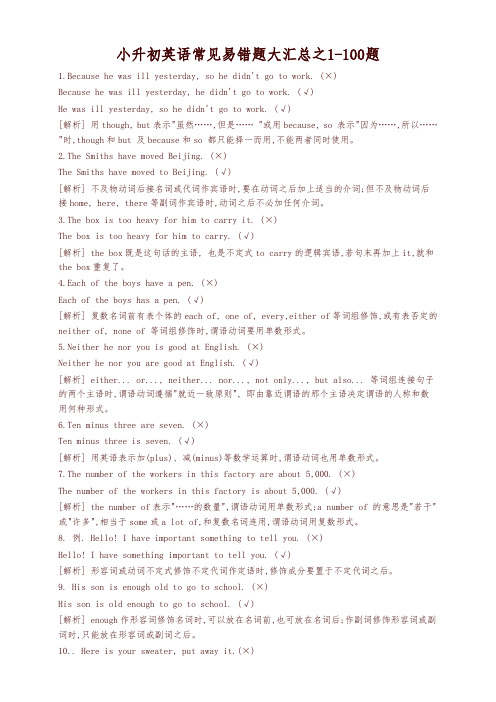
小升初英语常见易错题大汇总之1-100题1.Because he was ill yesterday, so he didn't go to work. (×)Because he was ill yesterday, he didn't go to work. (√)He was ill yesterday, so he didn't go to work. (√)[解析] 用though, but表示"虽然……,但是…… "或用because, so 表示"因为……,所以……"时,though和but 及because和so 都只能择一而用,不能两者同时使用。
2.The Smiths have moved Beijing. (×)The Smiths have moved to Beijing. (√)[解析] 不及物动词后接名词或代词作宾语时,要在动词之后加上适当的介词;但不及物动词后接home, here, there等副词作宾语时,动词之后不必加任何介词。
3.The box is too heavy for him to carry it. (×)The box is too heavy for him to carry. (√)[解析] the box既是这句话的主语, 也是不定式to carry的逻辑宾语,若句末再加上it,就和the box重复了。
4.Each of the boys have a pen. (×)Each of the boys has a pen. (√)[解析] 复数名词前有表个体的each of, one of, every,either of等词组修饰,或有表否定的neither of, none of 等词组修饰时,谓语动词要用单数形式。
5.Neither he nor you is good at English. (×)Neither he nor you are good at English. (√)[解析] either... or..., neither... nor..., not only..., but also... 等词组连接句子的两个主语时,谓语动词遵循"就近一致原则", 即由靠近谓语的那个主语决定谓语的人称和数用何种形式。
小升初英语易错题汇总

小升初英语易错题汇总1.Because he was ill yesterday, so he didn't go to work. (×)Because he was ill yesterday, he didn't go to work. (√)He was ill yesterday, so he didn't go to work. (√)[析 ]用 though, but表示 " 固然,但是" 或用because, so表示 "因为,所以 " 时, though和but及because和so都只好择一而用,不可以两者同时使用。
2.The Smiths have moved Beijing. (×)The Smiths have moved to Beijing. (√)[ 析]不及物动词后接名词或代词作宾语时,要在动词以后加上适合的介词;但不及物动词后接home, here, there等副词作宾语时,动词以后不用加任何介词。
3.The box is too heavy for him to carry it. (×)The box is too he avy for him to carry. (√)[析] the box既是这句话的主语,也是不定式to carry的逻辑宾语,若句末再加上it,就和the box重复了。
4.Each of the boys have a pen. (×)Each of the boys has a pen. (√)[析]复数名词前有表个体的each of, one of, every, either of等词组修饰,或有表否认的neither of, none of等词组修饰时,谓语动词要用单数形式。
5.例 : 那是你心软!我不就是一个例子吗?Neither he nor you is good at English. (×)Neither he nor you are good at English. (√)[ 析] either... or..., neither... nor..., not only..., but also...等词组连结句子的两个主语时,谓语动词按照" 就近一致原则 ",即由凑近谓语的那个主语决定谓语的人称和数用何种形式。
小升初英语易错题汇总
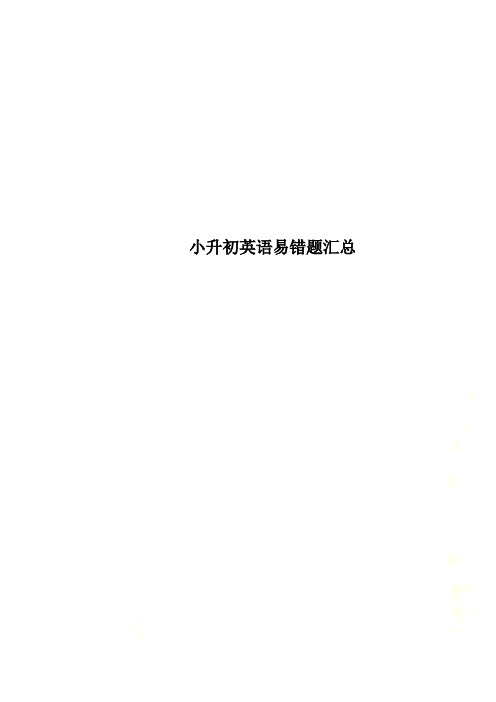
小升初英语易错题汇总小升初英语易错题汇总1.Because he was ill yesterday, so he didn't go to work. (×)Because he was ill yesterday, he didn't go to work. (√)He was ill yesterday, so he didn't go to work. (√)[析] 用though, but表示"虽然……,但是…… "或用because, so 表示"因为……,所以……"时,though和but 及because和so 都只能择一而用,不能两者同时使用。
2.The Smiths have moved Beijing. (×)The Smiths have moved to Beijing. (√)[析] 不及物动词后接名词或代词作宾语时,要在动词之后加上适当的介词;但不及物动词后接home, here, there等副词作宾语时,动词之后不必加任何介词。
3.The box is too heavy for him to carry it. (×) The box is too heavy for him to carry. (√) [析] the box既是这句话的主语, 也是不定式to carry的逻辑宾语,若句末再加上it,就和the box 重复了。
4.Each of the boys have a pen. (×)Each of the boys has a pen. (√)[析] 复数名词前有表个体的each of, one of, every,either of等词组修饰,或有表否定的neither of, none of 等词组修饰时,谓语动词要用单数形式。
5.例:那是你心软!我不就是一个例子吗?Neither he nor you is good at English. (×) Neither he nor you are good at English. (√) [析] either... or..., neither... nor..., not only..., but also... 等词组连接句子的两个主语时,谓语动词遵循"就近一致原则", 即由靠近谓语的那个主语决定谓语的人称和数用何种形式。
小升初英语易错题100道
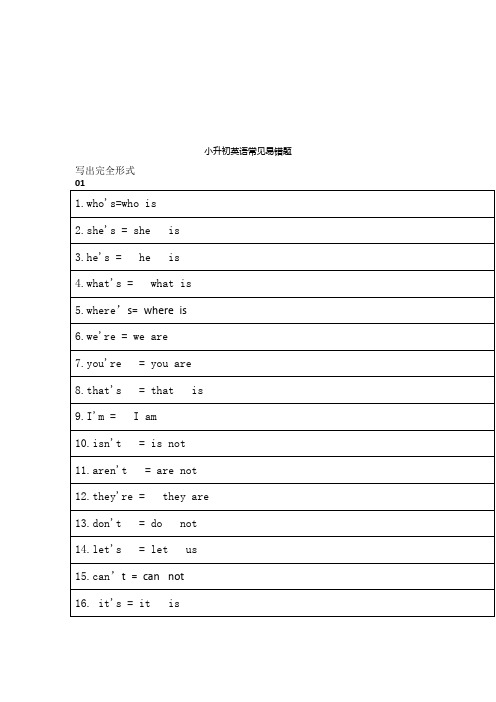
小升初英语常见易错题写出完全形式反义词或对应词近义词现在分词综合最后,补充一些易错题,同学们快来测试下自己的水平吧精挑单选易错题yi cuo ti ji jin( )1.It's cold today. You must _____the coat.A. take offB. put onC. take downD. put in( )2.I have two pencils. One is green, and _____is red.A. oneB. otherC. the otherD. others( )3.How many eggs _____in the bag?A. hasB. haveC. is thereD. are there( )4.____me, please.A. ListenB. sayC. Listen toD. talk( )5.---______day is tomorrow? ---It's Tuesday.A. WhoseB. WhatC. WhichD. When( )6.Would you like _____tea?A. someB. aC. anyD. many( )7.______morning she gets up at six.A. Every dayB. On everyC. In everyD. Every( )8.Don't _____late next time!A. isB. areC. beD./( )9.Oh, it's ____. How are you?A. youB. yourC. yoursD. he( )10.Mary doesn't _____her homework after lunch.A. doesB./C. doD. doing( )11.---How do you _____Tuesday? ---Er, T-U-E-S-D-A-Y. A. say B. speak C. talk D. spell( )12.Write _____ your exercise-books.A. down it inB. it down inC. down it onD. it down on( )13.The shop___ "Closed".A. writesB. talksC. saysD. speaks( )14.My favourite school days ___Friday and Saturday. A. is B. am C. are D. be( )15.Do you have any coloure pens?Sorry, I don't have_____. I think he has_____.A. any, anyB. some, someC. some, anyD. any, some( )16.Where is London? It’s in_____.A. AmericaB. JapanC. EnglishD. England( )17.Are they from ____?A. AustralianB. EnglishC. AmericanD. Canada( )18.One of my _____from Hangzhou.A. friends areB. friend isC. friends isD. friend are( )19.You can _____she likes bananas a lot.A. lookB. watchC. seeD. to see( )20.You are a teacher. What about ____?A. sheB. Li Pin brotherC. herD. your( )21.There____much_____ on the table.A. is, breadB. is, breadsC. are, breadD. are, breads( )22.What ______his friends ______doing?A. do, likesB. does, likeC. do, likeD. does, likes( )23.His son goes to a different school______.A. to hisB. from himC. from heD. from his( )24.One of the boys is English. All ______are Chinese. A. the others boy B. the other boyC. the other boysD. other boys( )25.I can't _____ the words(单词).They are too small. A. look B. see C. watch D. say( )26.______Alice's brother.A. HisB. He'sC. HerD. She's( )27.The map _____China is _____the wall.A. on...ofB. of...onC. of...inD. of...at( )28.Some postcards ______in the box.A. isB. areC. there isD. there are( )29.Mr John is working ______Jack.A. withB. toC. atD. and( )30.Our teacher often talks _____ us ____ English.A. to...onB. with...onC. with...inD. to...at( )31.Who______hard in your class?A. worksB. studysC. workingD. studying( )32.It's very nice ______meet you.A. toB. forC. ofD./( )33.Is the blue cup yours ______ mine?A. andB. butC. forD. or( )34.______are good friends.A. Mike and I BI and Mike C. Mike and me D. Me and Mike( )35.It's _____bus.A. red'sB. greenC. a blueD. yellow a( )36.Are ______here today?A. all weB. all of weC. we allD. all of boys( )37.Could I have_______?A. full oneB. a full onesC. full one bottleD. a full one( )38.Please give ___ a bottle of___.A. me...orangesB. she...orangeC. him...orangeD. her...oranges( )39.I want to put ______in the basket.A. this thingsB. these thingsC. that thingsD. those thing( )40.The car is ______full ______ move.A. too...tooB. to...tooC. too...toD. to...to( )41.Jim, please come______.A. thereB. to hereC. to homeD. here( )42.It's time to ______games. We all like ______ games.A. playing...playingB. play...playC. playing...playD. play...playing( )43.Let______. He must go to school.A. he goB. him goC. he to goD. him to go( )44.I'd like ______ a cup of tea.A. to eatB. to drinkC. eatD. drink( )45.---Thanks very much.---______.A. No thanksB. All rightC. You're welcomeD. you, too( )46.Linlin, what's that ______ English?A. inB. atC. forD. with( )47.Can he ______a bike?A. to rideB. ridesC. ridingD. ride( )48.______are they? They are at home.A. WhatB. HowC. WhoD. Where( )49.She often gets ______ late.A. to homeB. homeC. to hereD. to there( )50.I go to school ______bike every day.A. in theB. on myC. by theD. by my( )51.School______over at four in the afternoon.A. areB. beC. isD./( )52.On______way to school she often helps the old man.A. hisB. sheC. myD. her( )53.Don't______late for class.A. to beB./C. can'tD. be( )54.What time _____you and Jim _____up?A. does...getB. do...getsC. does...getsD. do...get( )55.He is _____ us. We all like him.A. friendB. friendlyC. friend toD. friendly to( )56.There______only bread and rice. We must go to buy some meat.A. areB. isC. beD. have( )57.Linlin, get the ______basket!A. shopB. shopingC. shoppingD. big shoping( )58._______is this pen?A. How muchB. How manyC. WhatD. Who's( )59.He doesn't want to ______late for school.A. isB. doesC. beD. goes( )60.The first class ______at eight o'clock.A. beginB. is beginningC. beginningD. begins( )61.Miss Gao ______lunch at school.A. has, notB. doesn't, hasC. don't, hasD. doesn't, have( )62.She can ______ a little Japanese.A. speakB. sayC. speaksD. says( )63._______bread would you like?A. ManyB. MuchC. How manyD. How much( )64.There are _______old men over there.A. anB. muchC. a lotD. a lot of( )65.I often buy something to eat on my way_____.A. schoolB. to schoolC. to homeD. to shop( )66.Is this ______ watch? Yes, it's_____.A. your, mineB. yours, mineC. yours, myD. your, my( )67.Let him ______the kite.A. to flyB. flyingC. fliesD. fly( )68.I have ____to do.A. many, workB. much, worksC. much, workD. many, works( )69.She is _______English girl.A. aB. anC. theD./( )70.How old _______you? I _______ten.A. are...isB. is...amC. are...amD. am...are( )71.What's that?______.A. It is deskB. It is a deskC. This is deskD. That is a desk( )72.----What does your father do?---____.A. workB. docterC. He is workingD. He’s a worker( )73.______. Are you Miss Sue? ——______,I'm mot.A. Sorry, Excuse meB. Excuse me, SorryC. Sorry, SorryD. Excuse me...Excuse me( )74.________? I'm in Class Three.A. Are you in Class ThreeB. What class you are in?C. What class are you inD. in what class( )75.These are_______.A. an eggB. a eggC. their eggD. eggs( )76.I'm in_______.A. Class Three, Grade TwoB. Grade Two, Class ThreeC. class three, grade twoD. grade two, class three( )77.Is this _______ ruler?A. heB. hisC. youD./( )78.Sorry, I _______ know.A. am notB. amC. doD. do not( )79.Is this a car? No, _______.A. it isn'tB. it isC. it'sD. this is not( )80.________old_______she?A. What...isB. What...areC. How...isD. How...are( )81.This is a bird. ______ name is Polly.A. It'sB. ItsC. itsD. It( )82._______this?This is Wang Lin.A. Who isB. Who areC. What isD. What are( )83.Is this a ______pencil-box?A. sheB. herC. yourD./( )84.They are_______.A.banana treeB.banana treesC.bananas treeD.bananas trees( )85.---Is the ship _____ now?---No, it's_____.A. open, closeB. open, closedC. opened, closedD. opened, close( )86.Is this ______ruler or ______ eraser?A. an...aB. a...anC. a...aD. an...an( )87.Are these ______ boxes?A. youB.IC. meD. your( )88._______everyone here?A. IsB. AreC. AmD./( )89.There aren't many people in the shop _____Mondays.A. inB. onC. atD. by( )90._______she have breakfast at school?A. DoB. HasC. DoesD. Is( )91.Look, the boy ______ near the house.A. is sitingB. sitC. sitsD. is sitting( )92.Where_______your father_______?A. does, fromB. come, fromC. are, fromD. is, from( )93.Would you give ______ to me, please?A. themB. theyC. theirD. they're( )94.Do you like _______ basketball?A. playB. playingC. playsD. is playing( )95.Her sister ______ Japanese at school.A. studyB. studyingC. studiesD. is study( )96.Does Wang Kai go to bed _______ten in the evening?A. atB. inC. forD. on( )97.Tom______every morning.A. cleans his bikeB. cleans bikeC. clean a bikeD. clean bike( )98.It's time _______ morning exercises.A. doB. doesC. to doD. doing( )99.Do you want to ______ English with me?A. askB. speakC. talkD. say( )100.Who_______your good friend?A. amB. areC. isD. does。
最新小升初英语易错题总结

最新小升初英语易错题总结小升初英语考试中常出现一些容易犯错的试题,下面将这些易错题汇总起来,供大家复习时练习。
1.Because he was ill yesterday, so he didn't go to work. (×)Because he was ill yesterday, he didn't go to work. (√)He was ill yesterday, so he didn'tgo to work. (√)[析] 用though, but表示"虽然……,但是……"或用because, so 表示"因为……,所以……"时,though和but 及because和so 都只能择一而用,不能两者同时使用。
2.The Smiths have moved Beijing. (×)The Smiths have moved to Beijing. (√)[析] 不及物动词后接名词或代词作宾语时,要在动词之后加上适当的介词;但不及物动词后接home, here, there等副词作宾语时,动词之后不必加任何介词。
3.The box is too heavy for him to carry it. (×)The box is too heavy forhim to carry. (√)[析] the box既是这句话的主语, 也是不定式to carry的逻辑宾语,若句末再加上it,就和the box重复了。
4.Each of the boys have a pen. (×)Each of the boys has a pen. (√)[析] 复数名词前有表个体的each of, one of, every,either of等词组修饰,或有表否定的neither of, none of 等词组修饰时,谓语动词要用单数形式。
小升初英语常见易错题大汇总

小升初英语常见易错题大汇总1.Because he was XXX。
so he didn't go to work。
(×)Because he was XXX。
XXX't go to work。
(√)He was XXX。
so he didn't go to work。
(√)[解析]用though。
but表示"虽然……,但是……"或用because。
so表示"因为……,所以……"时,though和but及because和so都只能择一而用,不能两者同时使用。
2.The Smiths have moved Beijing。
(×)XXX(√)[解析]不及物动词后接名词或代词作宾语时,要在动词之后加上适当的介词;但不及物动词后接home。
here。
there等副词作宾语时,动词之后不必加任何介词。
3.The box is too heavy for him to carry it。
(×)The box is too heavy for him to carry。
(√)[剖析] the box既是这句话的主语,也是不定式to carry的逻辑宾语,若句末再加上it,就和the box反复了。
4.Each of the boys have a pen。
(×)Each of the boys has a pen。
(√)[剖析]复数名词前有表个别的each of。
one of。
every,either of等词组润饰,或有表否认的neither of。
none of等词组润饰时,谓语动词要用单数形式。
5.Neither he nor you is good at English。
(×)XXX he nor you are good at English。
(√)[剖析] either。
or。
neither。
小升初英语必做易错题100道(word可编辑)

小升初英语易错100题1. This is my I-phone 5. Where's ?A. youB. yoursC. yourD. yourself2. ---Hi, Mom. When will you go to Beijing?---Tomorrow. You must look after ______ when I leave home.A.you B. yours C. your D. yourself3. I am awfully thirsty. Would you give me ?A. two bottles of orangesB. two bottles of orange C .two bottle of oranges D. two bottle of orange4. It was founded the night of October 10, 1946.A. atB. onC. inD. during5. ---Are these your pencils?---_____________________A. Yes, these areB. No, these aren’tC. Yes, they aren’tD. Yes, they are.6. ---Who knock(敲) at the door?---Maybe______ James.A. he’sB. she’sC. that’sD. it’s7. ---Who’s that speaking?---______.A. I’m TomB. That’s Tom speakingC. It’s meD. This is Tom8. This is ___________________.A. a friend of my sisterB. a friend of herC. a friend of hisD. a friend of my9. ---Linda, are you going to play _____ chess next Sunday.---Of course, and I’ll play ______violin that afternoon.A. the, theB. the, \C. \, theD. \, \ 10. Bob is ____ eleven-year-old boy.A. aB. anC. theD. /11. Bob is a _____________ boy.A. ten years oldB. ten-year-oldC. ten-years-oldD. ten year old12. ---Did you buy _______ for Lisa’s.---Certainly. I did.A. something unusualB. anything specialC. unusual somethingD. special anything13. The boy is to take care of himself.A. enough oldB. enough youngC. old enoughD. young enough14. My son is ____.Today is his _____birthdayA. twelve ; twelveB. twelfth; twelfthC. twelfth; twelveD. twelve; twelfth15. The volunteers(志愿者) took _____ books to a mountain village.A. two hundreds ofB. two hundred ofC. two thousandsD. two thousand16. He wrote _____ novel(小说) when he was _____ .A. five, fiftiesB. the fifth, fiftyC. fifth, fiftyD. five, fivety17. ______ your father _____ with you?A. Does; strictB. Do; strict C Is; strict D. Are; strict18. The books are very ______ . They sell very ______.A. good; goodB. well; wellC. well; goodD. good; well19. Can I join the ______ club?A. swimsB. swimmingC. swimD. swiming20.—are those vegetables?— Two yuan a kilo.A. How manyB. How muchC. WhatD. How21. ---_____will you return to Italy?--- In two weeks.A. How oftenB. How longC. How oftenD. How soon22. --- ____ do you get to the store.--- In a car.A. WhereB. What place C .How D. Whose23---What is the time? ---It’s________.A. a quarter to nineB. TuesdayC. Apr. 1stD. so early now24.---Do you have the time? My watch doe sn’t work. ---_______.A. No, I didn’tB. Yes, I doC. No, I am so busyD. Half past seven25. ----What’s the matter ___you?A. aboutB. toC. withD. for26. _____are Lily’s good friends.A. She, you and sheB. You, I and sheC. I, you and sheD. You, she and I27 ----_____ is your birthday? ----It’s August, 21st.A. WhatB. WhenC. HowD. How much28.. ______ do you like better, beef or mutton?A. WhatB. When D. Which D. Whose29 ----______ do they come here?---They have a meeting.A. WhenB. WhyC. WhatD. How30---_____ coffee do you want?---Two cups.A. How manyB. How muchC. WhatD. where 31.--- How often do you get to the zoo.--- _____. I don’t like animals.A. No oftenB. NeverC. OftenD. some time32. ---Where were you last Saturday?---I ______in the Capital Museum.A. amB. will beC. wasD. is going33. There is little milk in the glass, ?A. is thereB. isn't thereC. isn't itD. does it34. You should finish your lessons you go to play.A. whenB. soC. sinceD. before35. Mr. Black told Ann _____ her boyfriend who fell into drugs (毒品), but she never obeyed(遵守).A. to meet withB. to not meetC. not to meetD. meeting36. The teacher asked me ________ to her carefully.A. to listen B, not to listen C. listened D. listening37. Do you want ______play computer games with us.A. playB. playingC. to playD. played38. I asked him _____ computer games all the time. Because he got a poor grade.A. to playB. not playingC. playingD. not to play39. As a teacher, I want him ______ with his classmate on class.A. to talkB. talkingC. not talkingD. not to talk40.----Mom, may I play computer games,now?----Of course,but you have to finish______ the text first.A. to readB. readingC. readD. into41. ----Do you enjoy ______? Would you like ________with us?---I’d like to, but I have to look after my Mom.A. go hiking, comingB. to go hiking, to comeC. going hiking, to comeD. going hiking, coming42.---_____is the weather _____ today?-- It’s sunn y.A. What, look likeB. How,不填C. What, lD. How, like43. ---It’s very comfortable(舒适的)_____ in this building. Don’t you think so?---Sure.A. livingB. to liveC. living,D. lived44. I find it not easy _____ this house.A. buyingB. to buyC. buyD. bought45. ---Please stop _____ our class at once(立刻)!---Ok, I hear the ring, Mr. White.A. havingB. hadC. to haveD. have46. I forgot ______back to Tom’s backpack that I borrowed last week. So he was very angry.(give back的意思是“归还”)A. givingB. to giveC. gaveD. given47. Thanks for __________ me with the work.A. to helpB. helpedC. helpingD. not to help48. What about _______, today? It’s very hot.A. to swimB. swimmingC. not to swimD. swam49.How about __________, today? It’s very hot.A. to swimB. swimmingC. not to swimD. swam50. He spent much time in __________ all day.A. to swimB. swimmingC. not to swimD. swam51. He spent an hour ______ her homework..A. didB. to doC. not to doD. doing52. Be careful, _____ you will fall off the tree.A. soB. orC. butD. and 53. Never give up, ____ you’ll m ake it.A. soB. orC. butD. and54. Lucy and Lily are twins, Lucy like playing basketball,___ Lily doesn’t.A. soB. orC. butD. and55. I left the keys at home, ____ I had to wait outside the doorA. soB. orC. butD. and56. ______interesting book he has in his hand!A. How anB. HowC. WhatD. What an57. _________ careful my mother is!A. How anB. HowC. WhatD. What an58. It ______ hundreds of people ten months to build the bridge(桥).A. costB. spendC. paidD. took59. The pants ____ nice, I’ll take______.A. look; themB. looks; itC. look; itD. looks; them60. Could you _____ these books to the classroom?A. putB. takeC. bringD. make61. Every time Aunt Rose comes to my house, she ___ me a lot of gifts.A. bringB. takeC. carriesD. get62.----Would you like to play basketball with us?---_____, but I have to finish my homework first.A. Yes, I’d likeB. I’d like toC. Yes, I likeD. No, I don’t like63. He ___ better not keep talking now. I can hear nothing.A. hasB. is havingC. hadD. have64. ---Who is ___ about your father in the room? ---My uncle.A. tellingB. speakingC. sayingD. talking65. There is____milk left in the bottle. Would you go to the store and get ____?A. little, someB. a little, anyC. little, someD. a little, some66---Why can’t the boy understand what the America teacher said?---Because he is beginner, he knows ____ English.A. a littleB. littleC. not manyD. few67.--- May I play computer game now, Mom?---No, you ______. You must finish your homework first.A. can’tB. mustn’tC. needn’tD. won’t68 ---Must I do my homework on Sunday, Mom?---No, you ____ .We will go to movies with father.A. mustn’tB. don’t have toC. can’tD. shouldn’t69. Is there going to _____a meeting?A. haveB. be C .is D. will be70. It’s going to _____in BeijingA. snowB. sunnyC. windy71. It’s going to be ____in ShanghaiA. rain B .be warm C. hot72. He usually _____ the newspaper at home.A. readsB. seesC. watchesD. look at73. We will _____a basketball game tomorrowA. readB. seeC. watchD. look at74. She _____very beautifulA .looks B. look at C. looks for D. look out of75. My dog eats_____A. a lotB. lots ofC. a lot ofD. much too 76 .He is felling ______betterA. lots ofB. a lot ofC. a lotD. too77. I can _____somebody comingA. hearB. hearing C .listening D. listen78 .My family ____all listening to musicA. isB. areC. willD. have79. How many rooms are there in your _____A. homeB. houseC. family80. I took a taxi _____ the hospitalA. byB. onC. go toD. to81. What happened _____ your head ?A. withB. onC. to82. What’s wrong _____ your arm?A. withB. onC. to83. Who listens ____, Tom, Jack or Bill.A. the most carefully B .more carefully C. the most careful D. more careful84. . Mary usually spends______ time watching than Jim does.A. manyB. muchC. lessD. little85. ---What do you think of the films I’ve ever seen.---Oh, it’s one of ____ films I’ve ever seen.A. interestingB. more interestingC. most interestingD. the most interesting86. — what do you think of the flowers?-----they look _______ than any other flowers.A. beautifulB. beautifullyC. more beautifulD. much more beautifully87. ---What a nice watch it is!---Yes. It’s ____ one of all.A. expensiveB. more expensiveC. the most expensiveD. more expensive88 — It's time to go to bed, Jim. —O K. ,M o m.A. Good-byeB. See youC. Good afternoonD. Good night 89. — We'll go to Qing Yuan Mountain tomorrow. Why join us? —That's a good idea. A. notB. don'tC. can'tD. didn't90. I heard one of the pandas a baby. A. haveB. areC. hadD. has91. I'm taller than Bill, but I sit him.A. at the back ofB. behindC. in front ofD. far from92. — There was a telephone call for you. A. Who was it B. Who was heC. What was itD. Who was she93. —Merry Christmas and Happy New Year!— .A. It's very nice of youB. You're welcomeC. Thank youD. The same to you 94. One of _____ is playing basketball.A. boyB. the boyC. boysD. a boy 95. The bus is coming. Please .A. get it offB. get off itC. get it onD. get on it 96. ---My I-phone was lost when I took a bus yesterday. ---______________________A. I’m sorry to hear thatB. It doesn’t matter C . Don’t be silly(愚蠢的) D. I’d love to 97. Miss Li is English teacher.A. Tom and TinaB. Tom and Tina’sC. Tom’s and Tina’sD. Tom’s and Tina98. ---Can you help me my math homework, Miss Zhang? ---OK. Come to my house Sunday morning. A. with; in B. do; at C. to do; onD. to do; in99. ----You look very beautiful. ----__________________A. Don’t say thatB. You, tooC. You are more beautifulD. Thank you 100.—Is your father at home?---No, he’s working late_____ the office. A. on B. at C. of D. to。
小升初英语易错题汇总

小升初英语易错题汇总1.Because he was ill yesterday, so he didn't go to work. (×)Because he was ill yesterday, he didn't go to work. (√)He was ill yesterday, so he didn't go to work. (√)[析] 用though, but表示"虽然……,但是…… "或用because, so 表示"因为……,所以……"时,though和but 及because和so 都只能择一而用,不能两者同时使用。
2.The Smiths have moved Beijing. (×)The Smiths have moved to Beijing. (√)[析] 不及物动词后接名词或代词作宾语时,要在动词之后加上适当的介词;但不及物动词后接home, here, there 等副词作宾语时,动词之后不必加任何介词。
3.The box is too heavy for him to carry it. (×)The box is too he avy for him to carry. (√)[析] the box既是这句话的主语, 也是不定式to carry的逻辑宾语,若句末再加上it,就和the box重复了。
4.Each of the boys have a pen. (×)Each of the boys has a pen. (√)[析] 复数名词前有表个体的each of, one of, every,either of等词组修饰,或有表否定的neither of, none of 等词组修饰时,谓语动词要用单数形式。
5.例:那是你心软!我不就是一个例子吗?Neither he nor you is good at English. (×)Neither he nor you are good at English. (√)[析] either... or..., neither... nor..., not only..., but also... 等词组连接句子的两个主语时,谓语动词遵循"就近一致原则", 即由靠近谓语的那个主语决定谓语的人称和数用何种形式。
人教版,小升初英语易错试题大汇总,精品复习
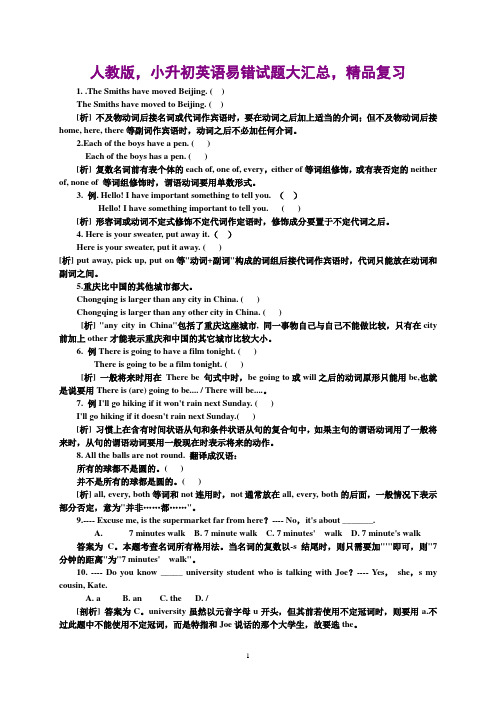
人教版,小升初英语易错试题大汇总,精品复习1. .The Smiths have moved Beijing. ( )The Smiths have moved to Beijing. ( )[析] 不及物动词后接名词或代词作宾语时,要在动词之后加上适当的介词;但不及物动词后接home, here, there等副词作宾语时,动词之后不必加任何介词。
2.Each of the boys have a pen. ( )Each of the boys has a pen. ( )[析] 复数名词前有表个体的each of, one of, every,either of等词组修饰,或有表否定的neither of, none of 等词组修饰时,谓语动词要用单数形式。
3. 例. Hello! I have important something to tell you. ()Hello! I have something important to tell you. ( )[析] 形容词或动词不定式修饰不定代词作定语时,修饰成分要置于不定代词之后。
4. Here is your sweater, put away it.()Here is your sweater, put it away. ( )[析] put away, pick up, put on等"动词+副词"构成的词组后接代词作宾语时,代词只能放在动词和副词之间。
5.重庆比中国的其他城市都大。
Chongqing is larger than any city in China. ( )Chongqing is larger than any other city in China. ( )[析] "any city in China"包括了重庆这座城市, 同一事物自己与自己不能做比较,只有在city 前加上other才能表示重庆和中国的其它城市比较大小。
小升初英语常见易错题大汇总之1-100题

小升初英语常见易错题大汇总之1-100题1.Because he was ill yesterday, so he didn't go to work. (×)Because he was ill yesterday, he didn't go to work. (√)He was ill yesterday, so he didn't go to work. (√)[解析] 用though, but表示"虽然……,但是…… "或用because, so 表示"因为……,所以……"时,though和but 及because和so 都只能择一而用,不能两者同时使用。
2.The Smiths have moved Beijing. (×)The Smiths have moved to Beijing. (√)[解析] 不及物动词后接名词或代词作宾语时,要在动词之后加上适当的介词;但不及物动词后接home, here, there等副词作宾语时,动词之后不必加任何介词。
3.The box is too heavy for him to carry it. (×)The box is too heavy for him to carry. (√)[解析] the box既是这句话的主语, 也是不定式to carry的逻辑宾语,若句末再加上it,就和the box重复了。
4.Each of the boys have a pen. (×)Each of the boys has a pen. (√)[解析] 复数名词前有表个体的each of, one of, every,either of等词组修饰,或有表否定的neither of, none of 等词组修饰时,谓语动词要用单数形式。
5.Neither he nor you is good at English. (×)Neither he nor you are good at English. (√)[解析] either... or..., neither... nor..., not only..., but also... 等词组连接句子的两个主语时,谓语动词遵循"就近一致原则", 即由靠近谓语的那个主语决定谓语的人称和数用何种形式。
【推荐】小升初英语易错试题大汇总

小升初英语易错试题大汇总1.Because he was ill yesterday, so he didn't go to work. (×)Because he was ill yesterday, he didn't go to work. (√)He was ill yesterday, so he didn't go to work. (√)[析] 用though, but表示"虽然……,但是…… "或用because, so 表示"因为……,所以……"时,though和but 及because和so 都只能择一而用,不能两者同时使用。
2.The Smiths have moved Beijing. (×)The Smiths have moved to Beijing. (√)[析] 不及物动词后接名词或代词作宾语时,要在动词之后加上适当的介词;但不及物动词后接home, here, there等副词作宾语时,动词之后不必加任何介词。
3.The box is too heavy for him to carry it. (×)The box is too heavy for him to carry. (√)[析] the box既是这句话的主语, 也是不定式to carry的逻辑宾语,若句末再加上i t,就和the box重复了。
4.Each of the boys have a pen. (×)Each of the boys has a pen. (√)[析] 复数名词前有表个体的each of, one of, every,either of等词组修饰,或有表否定的neither of, none of 等词组修饰时,谓语动词要用单数形式。
5.例:那是你心软!我不就是一个例子吗?Neither he nor you is good at English. (×)Neither he nor you are good at English. (√)[析] either... or..., neither... nor..., not only..., but also... 等词组连接句子的两个主语时,谓语动词遵循"就近一致原则", 即由靠近谓语的那个主语决定谓语的人称和数用何种形式。
小升初英语常见易错题大汇总之1-100题

小升初英语常见易错题大汇总之1-100题1.Because he was ill yesterday, so he didn't go to work. (×)Because he was ill yesterday, he didn't go to work. (√)He was ill yesterday, so he didn't go to work. (√)[解析] 用though, but表示"虽然……,但是…… "或用because, so 表示"因为……,所以……"时,though和but 及because和so 都只能择一而用,不能两者同时使用。
2.The Smiths have moved Beijing. (×)The Smiths have moved to Beijing. (√)[解析] 不及物动词后接名词或代词作宾语时,要在动词之后加上适当的介词;但不及物动词后接home, here, there等副词作宾语时,动词之后不必加任何介词。
3.The box is too heavy for him to carry it. (×)The box is too heavy for him to carry. (√)[解析] the box既是这句话的主语, 也是不定式to carry的逻辑宾语,若句末再加上it,就和the box重复了。
4.Each of the boys have a pen. (×)Each of the boys has a pen. (√)[解析] 复数名词前有表个体的each of, one of, every,either of等词组修饰,或有表否定的neither of, none of 等词组修饰时,谓语动词要用单数形式。
5.Neither he nor you is good at English. (×)Neither he nor you are good at English. (√)[解析] either... or..., neither... nor..., not only..., but also... 等词组连接句子的两个主语时,谓语动词遵循"就近一致原则", 即由靠近谓语的那个主语决定谓语的人称和数用何种形式。
小升初英语常见易错题大汇总之1-100题
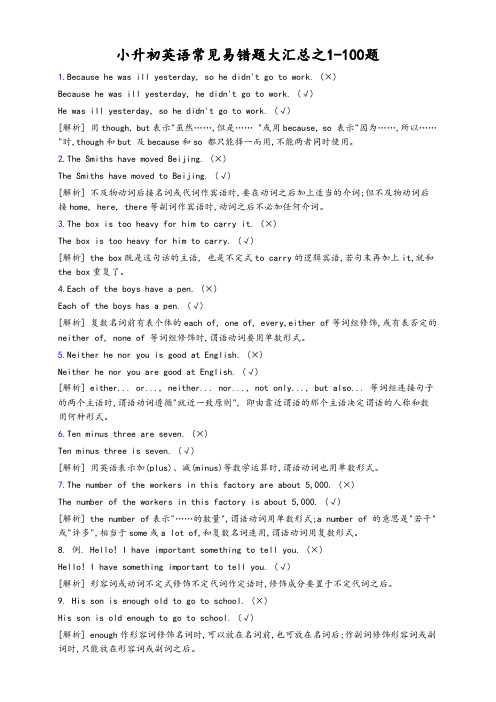
小升初英语常见易错题大汇总之1-100题1.Because he was ill yesterday, so he didn't go to work. (×)Because he was ill yesterday, he didn't go to work. (√)He was ill yesterday, so he didn't go to work. (√)[解析] 用though, but表示"虽然……,但是…… "或用because, so 表示"因为……,所以……"时,though和but 及because和so 都只能择一而用,不能两者同时使用。
2.The Smiths have moved Beijing. (×)The Smiths have moved to Beijing. (√)[解析] 不及物动词后接名词或代词作宾语时,要在动词之后加上适当的介词;但不及物动词后接home, here, there等副词作宾语时,动词之后不必加任何介词。
3.The box is too heavy for him to carry it. (×)The box is too heavy for him to carry. (√)[解析] the box既是这句话的主语, 也是不定式to carry的逻辑宾语,若句末再加上it,就和the box重复了。
4.Each of the boys have a pen. (×)Each of the boys has a pen. (√)[解析] 复数名词前有表个体的each of, one of, every,either of等词组修饰,或有表否定的neither of, none of 等词组修饰时,谓语动词要用单数形式。
5.Neither he nor you is good at English. (×)Neither he nor you are good at English. (√)[解析] either... or..., neither... nor..., not only..., but also... 等词组连接句子的两个主语时,谓语动词遵循"就近一致原则", 即由靠近谓语的那个主语决定谓语的人称和数用何种形式。
